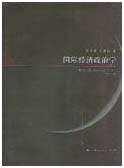The International Economic Politics
Author: Zhang Yuyan & Li ZenggangSilver Editor Source: Shanghai people pressTime :2008-01-01 22:07:00

The International Economic Politics is based on my experience teaching in this course at GSCASS (the Graduate School of Chinese Academy of Social Sciences) since 2000. The content of most chapters had been used as teaching materials many times. This book focuses on the economic analysis or explanation of international relations and consists of 16 chapters.
Chapter one is the general introduction, which gives the background, research problems, objectives and the structure of the work. The second chapter presents the basic theories including the new institutional economics, the public choice theory, the theory of the firm and the game theory. The third Chapter discusses the origin, nature and functions of the state, defines the meaning of the anthropomorphized nation, and shows the benefits and limits of the method that looks the countries as individuals. Chapter four and five make a definition of national interests and discuss the way to expand them with the game theory. Based on the new institutional economics, chapter six analyses the foundation, changing, innovation and implementation of the international rules. The seventh chapter deals with the nature and voting machines of the international organizations. Chapter eight covers the issues of international public goods, including its nature, characters and supply. Chapter nine and ten analyze the foundation and evolvement of the international trade policies and the international monetary system with the new political economy; show the source of the instability of international monetary system. Chapter eleven discusses the issues relative to the macroeconomic policies among nations. The twelfth chapter summarizes the effects on the internal firms and governments for the international capital and labor movements. Chapter thirteen focuses on the decision of oil price. Chapter fourteen gives some points on the war and peace. The fifteenth chapter is about the economic globalization and the institutions of global governance. Last but not least, chapter sixteen gives some comments on the politics and economics relative to the rise and decline of nations.
As a textbook for graduates, the International Economic Politics does not aim to offer potential researchers a clear and final answer, but to raise some important and interesting questions and to provide an up-to-date review of the existing literature which may show them the right way to the answer.